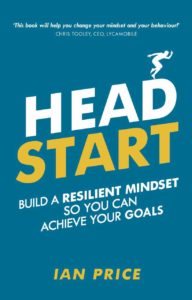Don’t believe everything you read in an Instagram meme, says psychologist and author Ian Price who believes some nuggets of positive thinking can hinder success
Positive thinking. Positivity. A positive mindset. These are all good for achieving our goals, right? After all, how could they possibly be negative?
Well, if you look at the science, it depends on what you mean by ‘positive’. On the one hand, there is Positive Psychology, an evidence-based strand of behavioural science that has been shown to help us flourish and achieve happiness. On the other, there is empty positive thinking and pseudoscience.
Here are seven ways in which positive thinking can actually inhibit goal achievement.
1. Taking pseudoscience seriously
If we take the advice of books such as ‘The Secret’, simply the act of thinking positive thoughts will somehow cause particles in the ‘universe’ to align and deliver us our dreams.
There is, I’m afraid, no ‘law of attraction’, nor is there any basis for these ideas even in quantum physics. Isn’t it also offensive to suggest that someone that has experienced misfortune – a terrorist attack, for example – has brought it upon themselves through negative thinking?
There is, I’m afraid, no ‘law of attraction’
Rather than looking for guidance from pseudoscience, look for what legitimate science tells us.
Having negative beliefs can inhibit goal achievement not because of any ‘law of attraction’ but because they drive our behaviour.
If we believe we aren’t capable of achieving something, then this can be self-fulfilling, as we will quit in the face of adversity or not even get started. Learn about building a growth mindset and reframe how we think about failure and challenges.
2. Visualising your goal
Visualising has been shown to help with specific physical pursuits such as sport. A footballer that visualises where her penalty kick is going is much more likely to get the ball to land on target.
However, scientific research shows that simply visualising a long-term goal does not help achieve it; whether your goal relates to academic achievement, weight loss or personal relationships. In fact, visualising makes goal achievement less likely. So picturing your dream home or yacht will not, as suggested in ‘The Secret’, cause it magically to arrive.
Goal achievement is much more likely when you focus less on the overarching outcome goal – which can be intimidating and feel unachievable – and instead build a goal hierarchy from the bottom up. By focusing on the minute, quotidian process goals you are more likely ultimately to succeed.
Johanna Konta was terrified when she began to break through on the tennis tour because she was asked so frequently about winning Wimbledon. She overcame this not by visualising success at SW19 but by developing a “process mindset” instead – as a result, her international ranking soared.
3. Blaming yourself for negative events
If good things happen because we get the ‘universe’ to align around our positive thoughts, then when bad things happen it must, by the same logic, be something we brought upon our own heads through allowing those terrible negative thoughts to seep out. So whatever misfortune we experience is compounded by the misperceived notion that we’ve somehow brought it upon ourselves.
Instead of blaming yourself for negative events, take responsibility for what’s happened if you have genuinely caused it. If not, put it behind you and persist towards goal pursuit. There is, after all, such as thing as bad luck. It is outside your control and remember that very few goal achievers do not experience setbacks along the way.
4. Trying to boost motivation
If your goal feels like an ambitious one, it’s natural to reach for a motivational uplift. But watching YouTube videos of motivational speakers, reading quotes and platitudes on social media (often written over an inspirational background of the soaring eagle variety) won’t boost motivation. Neither will writing them in beautiful italics on your living room wall – or, worse still, getting them tattooed on your person. These activities may at best give you a brief sugar-pill uplift. But that’s it.
Work out your process goals and pick these off one at a time
Behavioural scientists observe that successful people develop virtuous habits. Rather than trying to heighten your level of motivation with your outcome goal in mind, work out your process goals and pick these off one at a time.
Figure out when in the day your motivation is highest (if you’re a lark, this will be first thing in the morning) and carve out some of that time to work on small process goals. I’m a fully paid-up lark and wrote my book by having a 500-word target to achieve each morning between 7 and 8 am.
5. Being relentlessly upbeat
Achieving our goals is not aided by sustaining a Pollyanna-ish optimism whatever happens to us. As well as being exhausting, this can actively reduce our chances of success, particularly if we do not confront problems and enter a state of denial.
Planning for negative outcomes before they happen puts us in a better place to deal with them if they do happen. If things do go wrong, take responsibility for them and fully take on board the learning.
6. Repeating positive affirmations to yourself
Remember Steve Coogan’s oily salesman character Gareth Cheesman? He looked at himself in the mirror before a sales meeting and shouted “You’re a tiger!” before letting out a growl. Research shows that artificially trying to boost self-esteem through the repetition of positive affirmations can have the reverse effect. Our emotional brain is not convinced by these hollow words and dissonance sets in.
Instead of trying to boost self-esteem artificially, stop worrying about it altogether. Accept as great athletes do that it will rise and fall according to circumstance and focus on your process goals. When you achieve these and, ultimately, your outcome goal also, an increase in self-esteem will be a natural output.
7. Posturing like a primate
For those for whom goal achievement involves public speaking or presentations to decision makers, lack of confidence can inhibit great delivery making success less likely. In her now famous TED-talk on body language, sychologist Amy Cuddy recommends adopting a dominant posture for a few minutes before the event.
Scientific research does indeed demonstrate a small uplift to confidence. But the effect is small. Research also shows a small happiness uplift if we hold a pencil beneath our teeth – the two-way relationship between our brain and our facial muscles causes the artificial smile our face forms to feed back to the brain that we’re smiling. But doctors do not prescribe holding a pencil between our teeth if we’re feeling depressed.
For a more substantial and lasting uplift to confidence, we need to work hard on our skills, be this in presenting or anything else critical to goal achievement. Learn from performance scientists about deliberate practice. Get expert help and feedback; push yourself outside of your comfort zone.

Related Healthista Content
Brain training: 7 surprising hacks to boost your mind
7 happiness short cuts this psychologist wants you to do every day
10 foods proven to relieve stress
11 self-care tips these wellness experts want you to do daily
Like this article? Sign up to our newsletter to get more articles like this delivered straight to your inbox.
























































